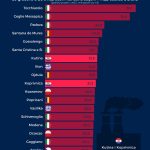ZAGREB, January 30, 2019 – Environment and Energy Minister Tomislav Ćorić said on Tuesday that in the next 30 years Croatia could become self-sufficient in electricity production and eventually start exporting electricity.
Ćorić made the statement at the conference “Towards a new energy strategy”, organised by the Jutarnji List daily. He noted that for a country the size of Croatia it was difficult to achieve full energy independence, especially with fossil fuels. “What we can do over the next 10 or 20 or 30 years is to try to fully meet our needs from our own electricity production and eventually start exporting, because we have sufficient renewable energy potential,” the minister said.
Ćorić said he expected Parliament to adopt the new national energy strategy by the end of the second quarter, adding that the Green Paper of the Hrvoje Požar Energy Institute, which had been under public consultation in the last few months, served as the platform for the preparation of the strategy.
Ćorić noted that the Green Paper saw the largest potential in renewable energy sources, primarily the wind and sun. As for gas infrastructure, he said that gas consumption was expected to stagnate and decrease by 2050.
Sabina Škrtić, a board member of the ENNA Group, said that the Green Paper offered an inappropriate energy mix without sufficiently recognising waste energy and gas infrastructure. “The Green Paper should try to take advantage of the best that Croatia has and offer an optimum mix that will, first and foremost, lead to competitiveness,” Škrtić said.
The CEO of RWE Energija, Zlatko Miliša, said that solar energy could be the “golden goose” for Croatia given that it has over 50 percent more hours of sunshine than some countries in continental Europe. “Each feasibility study of ours starts off with 50 percent better results,” Miliša said. He noted that costs of technology in this sector are rapidly falling, which opens the possibility of operating solar power plants without subsidies.
“With the existing costs of electricity, projects for the construction of solar power plants along the Adriatic coast can become profitable within six to eight years without any subsidies,” Miliša estimated.
Petar Sprčić, a board member of the state-owned power company HEP, said he was pleased that the strategy defined self-sufficiency among its goals and that Croatia was starting to use its own resources.
Minister Ćorić said that the construction of an LNG terminal on the northern Adriatic island of Krk would bring about security in terms of diversifying supply routes and would become commercial over time. He said he believed Croatia would find commercial interest in it, primarily in capacity booking by companies from neighbouring countries.
Ćorić said that from the point of view of energy security and the geopolitical point of view, this was one of the few projects that could put Croatia on the map of Europe and the world. “I’m not sure if there is an energy project of such potential in our neighbourhood,” he said.
Ćorić said he believed that capacity booking would increase with time from the present 520 million cubic metres out of the total of 2.6 billion cubic metres. He cited several letters of intent from Hungarian companies and the possible interest of Slovenian companies.
Sandor Fasimon, the CEO of the INA oil and gas company, which has made an offer for the lease of capacity of the future LNG terminal, said he understood Croatian government efforts about this project because more options and alternative sources would lead to greater security of supply.
More news on the energy issues in Croatia can be found in the Business section.







